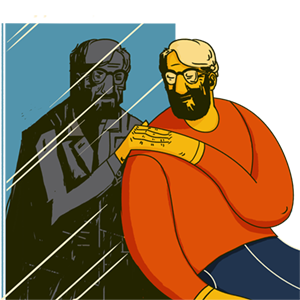for the loss of my faith…for my detachment from all those things that I once held dear
“I hated the book. I didn’t like any of the characters.”
These are sentences I hear now and then in my book club. I never quite understand why disliking a character who is intentionally portrayed as dislikable would lead to disliking a book as a whole. But I do know that when we care for and identify with a character, whether in fiction or non-fiction, our reading experience is enrichened. We find comfort in characters who are similar to ourselves and whose stories reflect our own.
My story is complex and includes multiple interwoven elements. There is the alienation of my two brothers from my family and from myself, one due to his decision to leave religion, the other for the same reason with the added challenge of his coming out as gay. There is illness in the form of cancer and AIDS. And there is my own decision to leave religion later in life followed by my struggle to reconnect to my brothers, decades after their deaths.
The memoir that comes closest in theme to my story is All Who Go Do Not Return by Shulem Deen. He tells of leaving his ultra-Orthodox, ultra-cloistered community and being cut off, by court ruling, from his children.
Identity and universality are tricky to understand. I found myself deeply affected by the stories told by the hillbilly, the Mormon fundamentalist, the gay Christian, the African American professor. I identified with the emotions of their experiences. But elements of Shulem Deen’s story—language, scenery, ways of thinking—although not identical to my own, are so familiar that, upon entering my mind, they penetrate directly into primordial cells in my being.
Near the end of the book, Deen goes to a Rainbow gathering, “an annual event of living off the grid for several days with peace, love, and thousands of unshowered bohemians.” The singing and dancing at that completely secular event evoke for him the spirituality he experienced in his youth at a tisch, a gathering of men with their rebbe.
Upon returning to the city, he reflects, “What I longed for was not the tisch of my past but a return to a time and place when ideas moved me even if they didn’t make perfect sense, a time when I allowed myself to be fired up with passion for something, anything, because it held a “truth” that had made itself evident during a moment of inspired consciousness.”
Deen mourns the loss of an identity he chose to leave behind because it didn’t suit him. The book’s closing words are a lament. “And for the loss of my faith…for my detachment from all those things that I once held dear, I let the stream of tears fall over the open pages of my prayer book.”
Deen has not triumphed. He has not been able to reverse the court ruling that cut him off from his children. He does not present a new narrative. He cries for the loss of faith, for loss of identity.
But Deen’s book has been read by tens of thousands, many of whom find in it clarity and comfort. The comfort of knowing that we are not alone. Of knowing that, just like the gay man cannot decide to convert to heterosexual, a formerly religious person cannot deny her identity, even if it means longing for and mourning something intentionally left behind. All who go do not return.
Thanks to Shulem Deen, I know that I am not alone in the paradox of cherishing my new, non-religious way of being while still mourning the loss of my belief.
Read next: Identifying by that which You Are Not


